- Home
- Peter Høeg
Smilla's Sense of Snow Page 5
Smilla's Sense of Snow Read online
Page 5
I could have kissed Newton. Later I despaired over Ernst Mach’s criticism of the bucket experiment, the criticism which formed the basis for Einstein’s work. I was younger then and more easily moved. Today I know that all we did was prove that Newton’s arguments were inadequate. Every theoretical explanation is a reduction of intuition. No one has budged my or Newton’s certainty about Absolute Space. No one is going to find his way home to Qaanaaq with his nose stuck in Einstein’s writings.
“So what do you think happened?”
There is nothing as disarming as a sympathetic response.
“I don’t know,” I say. That’s very close to being the truth.
“What do you want us to do?”
My objections suddenly seem so transparent here in the daylight, where the snow has melted, and across Knippels Bridge life is going on, and a courteous person is speaking to me. I have no reply.
“I’ll review the case again,” he says, “from beginning to end, and look at it in light of what you have told me.”
We climb down, and it’s also a descent into the depression waiting for me down there.
“I’m parked at the corner,” he says.
And then he makes his big mistake.
“I would suggest that while we review the case, you withdraw your complaint. So that we can work undisturbed. And for the same reason, if the newspapers should contact you, I think you ought to refuse to comment on the case. And don’t mention what you’ve told me, either. Refer them to the police; tell them we’re still working on the case.”
I can feel myself blushing. But it’s not from embarrassment. It’s from anger.
I’m not perfect. I think more highly of snow and ice than love. It’s easier for me to be interested in mathematics than to have affection for my fellow human beings. But I am anchored to something in life that is constant. You can call it a sense of orientation; you can call it woman’s intuition; you can call it whatever you like. I’m standing on a foundation and have no farther to fall. It could be that I haven’t managed to organize my life very well. But I always have a grip—with at least one finger at a time—on Absolute Space.
That’s why there’s a limit to how far the world can twist out of joint, and to how badly things can go before I find out. I now know, without a shadow of a doubt, that something is wrong.
I don’t have a driver’s license. If I’m dressed up, there are too many parameters to keep in check if I have to steer a bicycle, survey the traffic, maintain my dignity, and hold on to a little hunter’s hat I bought at Vagn’s on ∅ster Street. So I usually either walk or take a bus.
Today I decide to walk. It’s Tuesday, December 21, and it’s cold and clear. First I stroll to the library of the Geological Institute on ∅ster Vold Street.
One sentence that I’m quite fond of is Dedekind’s postulate about linear compression. It says—more or less—that anywhere in a series of numbers, within any infinitesimally small interval, you can find infinity. When I look for the Cryolite Corporation of Denmark in the library’s computer, I find enough material for a year’s worth of reading.
I select White Gold. It turns out to be a book with sparkles. The workers at the cryolite quarry have a sparkle in their eyes, the industrial tycoons that earn the dough have a sparkle in their eyes, the Greenlandic clean-up staff have a sparkle in their eyes, and the blue fjords of Greenland are full of reflections and flashes of sunshine.
Then I stroll past ∅sterport station and down along Strand Boulevard. To number 72B, where the Cryolite Corporation of Denmark—next to its competitor, the ∅resund Cryolite Corporation —had 500 employees and two laboratory buildings and a raw cryolite hall and a sorting hall and a canteen and workshops. Now all that’s left is railroad tracks, the demolished plant, some sheds and shacks, and a single red brick building. From my reading I know that the two big cryolite deposits at Saqqaq in Greenland were finally depleted in the sixties and that during the seventies the company switched over to other activities.
Now there is only a barricaded area, a driveway, and a group of workmen wearing white coveralls enjoying a quiet Christmas beer, getting ready for the approaching holiday.
A bold and enterprising girl would go right up to them and salute like a Girl Scout and talk their lingo and pump them for information about who Mrs. Lübing was and what happened to her.
I don’t have that kind of directness. I don’t like talking to strangers. I don’t like Danish workmen in groups. Actually, I don’t like any men at all in groups.
While I’ve been thinking, I’ve walked all the way around the block, and the workmen have caught sight of me and wave me closer, and they turn out to be courteous gentlemen who have been employed there for thirty years, and who have the melancholy task of closing down the place, and who know that Mrs. Lübing is still alive and that she lives in the Frederiksberg district and is listed in the phone book, and why do I want to know?
“She did me a favor once,” I tell them. “Now I want to ask her about something.”
They nod and say that Mrs. Lübing did a lot of favors for people, and they have daughters of their own my age, and they tell me to stop by again.
On my way back toward the city along Strand Boulevard I think that inside even the most paranoid suspicion there is a sense of humanity and the desire for contact waiting to emerge.
No one who has lived side by side with animals that have plenty of room can ever visit the zoo. But one time I take Isaiah along to the Natural History Museum to show him the room with the seals.
He thinks they look sickly. But he’s fascinated with the model of the aurochs. On the way home we walk through Fælled Park.
“How old did it say it was?” he asks.
“Forty thousand years old.”
“Then it’s going to die soon.”
“You’re probably right.”
“When you die, Smilla, can I have your hide?”
“All right,” I say.
We walk across the Triangle. It’s a warm autumn day, the air is misty.
“Smilla, can we go to Greenland?”
I see no reason to spare children from unavoidable truths. They have to grow up to bear the same burdens as the rest of us.
“No,” I say.
“All right.”
I’ve never promised him anything. I can’t promise him anything. Nobody can promise anyone anything.
“But we can read about Greenland.”
He says “we” about our reading aloud, aware that he contributes just as much by his presence as I do.
“In what book?”
“In Euclid’s Elements.”
It’s dark by the time I get home. The mechanic is pushing his bicycle down into the basement.
He is very wide, like a bear, and if he straightened up his head he would be quite imposing. But he keeps his head down, maybe to apologize for his height, maybe to avoid the doorframes of this world.
I like him. I have a weakness for losers. Invalids, foreigners, the fat boy of the class, the ones nobody ever wants to dance with. My heart beats for them. Maybe because I’ve always known that in some way I will forever be one of them.
Isaiah and the mechanic had been friends from the time before Isaiah learned to speak Danish. They probably didn’t need many words. One craftsman recognizing another. Two males who were alone in the world, each in his own way.
I follow along as he pushes the bike downstairs. I have an idea about the basement.
He has gotten a double room for a workshop. It has a cement floor, warm, dry air, and a bright yellow electric light. The limited space is packed full. There’s a workbench running along two walls. Bicycle wheels and inner tubes on hooks. A milk crate full of defective potentiometers. A plastic panel with nails and screws on it. A board with small insulated pliers for working with electronics. A board full of hooks. Ten square yards of plywood with what looks like all the tools in the world. A row of soldering irons. Four shelves of plumbing supplies, pa
int cans, dismantled stereos, sets of socket wrenches, welding electrodes, and an entire set of Metabo electrical tools. Against the wall two large canisters for a CO2 welder, and two small ones for a blowtorch. There is also a washing machine in pieces. Buckets full of a solution to fight dry rot. A bicycle stand. A foot pump.
There are so many things gathered here that they seem to be waiting for the slightest excuse to create chaos. On a purely personal level, I think all you’d have to do is send me in here alone to turn on the light, and that would trigger such a state of confusion that you wouldn’t even be able to find the light switch afterward. But as it is now, everything is kept in its place by the thoroughly pragmatic sense of order of a person who wants to make sure he can always find whatever he needs.
The place is a double world. Above is the workbench, the tools, the tall office chair. Below, under the table, the universe is duplicated half-size. A little masonite table with a coping saw, screwdriver, chisel. A little stool. A workbench. A little vise. A beer crate. A cigar box with maybe thirty cans of Humbrol. Isaiah’s things. I’ve been in here once before when they were sitting and working. The mechanic on the chair, bent over a magnifying glass on a stand; Isaiah on the floor, in his underpants, lost to the world. There was the smell of burning solder and epoxy hardener in the air. And something else, something stronger: total, all-consuming concentration. I stood there for maybe ten minutes. They didn’t look up once.
Isaiah wasn’t equipped for the Danish winter. Only occasionally would Juliane manage to dress him adequately. After I had known him for six months, he contracted his fourth severe middle ear infection in eight weeks. When he came out of the penicillin daze, he was hard-of-hearing. After that I would sit in front of him when I read so that he could follow the movement of my lips. In the mechanic he found someone with whom he could communicate in other ways than through language.
For several days I’ve been walking around with something in my pocket because I’ve been expecting this meeting. I show it to him now.
“What’s this?”
It’s the suction cup that I took from Isaiah’s room.
“A ‘cup.’ Glaziers use them to carry large pieces of glass.”
I take the things out of the beer crate. There are several pieces of carved wood. A harpoon, an ax. A boat carved from a dense, rather speckled kind of wood, maybe pear. An umiaq. It’s rubbed smooth on the outside and hollowed out with a gouge. A slow, meticulous, carefully executed job. There is also a car made of bent and glued aluminum strips cut from an almost paper-thin sheet. Pieces of rough colored glass that have been melted and stretched over a Bunsen burner. Several pairs of glasses. A Walkman. The cover is gone but it has been ingeniously repaired with a Plexiglas plate and tiny hinges screwed on. It’s lying in a hand-sewn vinyl case. The whole thing bears the mark of a joint project for a child and an adult. There is also a stack of cassette tapes.
“Where’s his knife?”
The mechanic shrugs. After a moment he plods off. He’s the whole world’s 200-pound friend, and buddy-buddy with the custodian, too. He has keys to all the basement rooms and can come and go as he pleases.
I pick up the little stool and sit down on it by the door, so I can see the whole room.
At boarding school we each had a cupboard 12 by 20 inches. It had a lock. The owner had a key for it. Everyone else could open it with a steel comb.
There’s a widespread notion that children are open, that the truth about their inner selves just seeps out of them. That’s all wrong. No one is more covert than a child, and no one has a greater need to be that way. It’s a response to a world that’s always using a can opener to open them up to see what’s inside, wondering whether it ought to be replaced with a more useful sort of preserves.
The first need that developed at boarding school—aside from the perpetual, never truly satisfied hunger—was the need for peace. There is no peace in a dormitory. So the need is suppressed. It turns into a need for a hiding place, for a secret room.
I try to imagine Isaiah’s situation, the places he went. The apartment, the housing block, the kindergarten, the embankment. Places that could never be thoroughly searched. So I stick to the place at hand.
I look around the room. Very carefully. Without finding anything. Other than the memory of Isaiah. Then I call up the image of the way it looked the two times I was here before, a long time ago.
I must have been sitting there half an hour when it came to me. Six months ago the building was inspected for dry rot. The insurance company brought over a dog that was trained to sniff it out. It found two smaller patches. They knocked them down and then swabbed the area. One of the places where they worked was in this room. They opened the wall three feet off the floor. They bricked it up again, but it still hasn’t been covered with plaster like the rest of the wall. Underneath the workbench, in the shadows, there is still a rectangle of 6 by 6-inch bricks.
And yet I almost didn’t find it. He must have waited while the workers were finishing up. Then he went in while the mortar was still damp and pushed one brick slightly inward. He waited for a moment and then pulled it back into place. He kept at it until the mortar was dry. Quietly and calmly, the whole evening, at fifteen-minute intervals, he drifted down to the basement to move the brick an inch. That’s what I imagine. You couldn’t fit the blade of a knife in between the brick and the mortar. But when I press on it, it slides right in. At first I can’t understand how he got it out, because there’s nothing to grab hold of. Then I pick up the suction cup and stare at it. I can’t shove the brick inward because it would simply fall into the wall cavity. But when I put the black rubber disk against the brick and use the little handle to create suction, the brick comes out toward me with a great deal of resistance. When I have it out, I understand why. A little blue nail has been pounded into the back. Twisted around it is a thin nylon cord. A big drop of epoxy, now hard as stone, had been applied to the nail and cord. The cord runs down into the wall cavity. On the end hangs a flat cigar box with two thick rubber bands around it. The whole thing is a dream of technical ingenuity.
I put the box in my coat pocket. Then I tuck the brick back in place.
Chivalry is an archetype. When I came to Denmark, Copenhagen County gathered a class of children at Rugmarken’s School to learn Danish, near the welfare barracks for emigrants in Sundby on Amager. I sat next to a boy named Baral. I was seven and had short hair. During recess I played ball with the boys. After about three months there was a lesson in which we were supposed to say each other’s names.
“And next to you, Baral, what is her name?”
“His name is Smilla.”
“Her name is Smilla. Smilla is a girl.”
He looked at me in mute astonishment. After the first shock had receded, and for the rest of the school year, there was only one real difference in his behavior toward me. It was now augmented by a pleasant, courteous helpfulness.
I found the same thing in Isaiah. He might suddenly switch over to Danish in order to use De, the polite form of address, with me after he came to understand the inherent respect contained in that expression. Over the last three months, when Juliane’s self destruction was greater and more directed than ever, he sometimes didn’t want to go home at night.
“Do you think,” he said, addressing me formally in Danish, “that I could sleep here?”
After I had given him a bath I would put him up on the toilet seat while I rubbed him with lotion. From there he could see his own face in the mirror, sniffing suspiciously at the rose scent of Elizabeth Arden’s night cream.
He has never, while awake, touched me. He never took my hand, he never gave any caresses, and he never asked for any. But during the night, he would sometimes roll over toward me, sound asleep, and lie there for several minutes. Against my skin he would get a diminutive erection that came and went, came and went, like Punch in a puppet show.
On those nights I wouldn’t sleep much. At the slightest change in his
rapid breathing, I woke up. Often I would simply lie awake, thinking that the air I was breathing was the air he had just exhaled.
8
Bertrand Russell wrote that pure mathematics is the field in which we don’t know what we’re talking about or to what extent what we say is true or false.
That’s the way I feel about cooking.
I eat mostly meat. Fatty meat. I can’t keep warm on vegetables and bread. I’ve never managed to acquire an understanding of my kitchen, of raw ingredients, or of the basic chemistry of cooking. I have only one simple work principle: I always make hot food. That’s important when you live alone. It serves a mental hygienic purpose. It keeps you going.
Today it serves another purpose as well. It puts off two telephone calls. I don’t like talking on the phone. I want to see whom I’m talking to.
I put Isaiah’s cigar box on the table. Then I make the first call.
I’m actually hoping that it’s too late; it’ll be Christmas soon, and people should be leaving work early.
I call the Cryolite Corporation. The director is still in his office. He doesn’t introduce himself; he is merely a voice, dry, implacable, and unsympathetic, like sand running through an hourglass. He informs me that the government was represented on the board, and since the company was now in the process of closing down, and the foundation was being reorganized, it had been decided to transfer all papers to the national archives, which houses documents dealing with decisions made by public authorities. Some of the papers—he was not able to tell me which ones—would fall into the category of “general resolutions,” which remain confidential for fifty years, while others—again he could not, as I must understand, tell me which ones—would be regarded as personal files, which enjoy eighty years of protection.

 The Woman and the Ape
The Woman and the Ape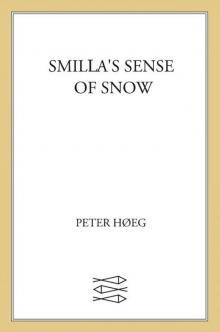 Smilla's Sense of Snow
Smilla's Sense of Snow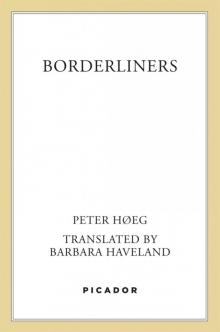 Borderliners
Borderliners The Susan Effect
The Susan Effect The History of Danish Dreams
The History of Danish Dreams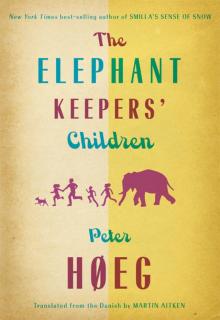 The Elephant Keepers' Children
The Elephant Keepers' Children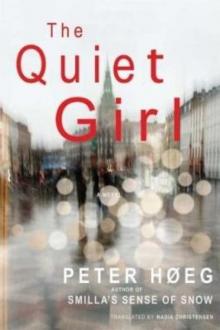 The Quiet Girl - Peter Hoeg
The Quiet Girl - Peter Hoeg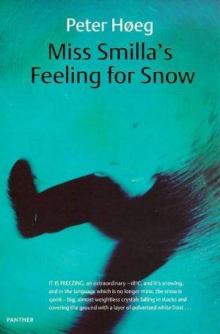 Smilla's Sense of Snow aka Miss Smilla's Feeling for Snow
Smilla's Sense of Snow aka Miss Smilla's Feeling for Snow